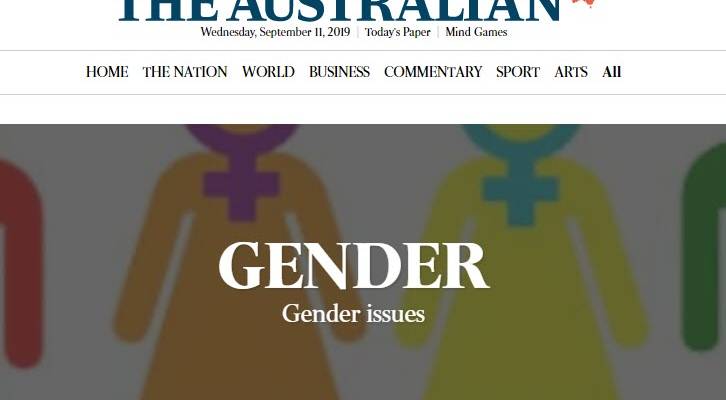
In early August, The Australian launched the debate we imagine roughly zero transgender people asked for: “Trans nation: the gender debate”.
An early story reported that clinicians had written to Health Minister Greg Hunt and the Royal Australasian College of Physicians Clinicians (RACP) calling for “an urgent national inquiry” into hormone treatments to account for the recent “poorly understood” surge in transgender youth.
That inquiry was accepted and deferred by Hunt to RACP. They agreed to look into it while noting that, as an educational body, they don’t actually do inquiries. With the Oz unbowed and citing one of the “clinician’s” calls for a national inquiry, Crikey unpacks how, exactly, you sell an ideological war against trans people as news.
Pick your critics and voices
Bernard Lane has led the charge in this Holy War. Four experts have been key to his reporting. The Australian refers to them as “clinicians” but one (Dr Geoff Holloway) is actually a health sociologist who describes himself as “pro-radical feminism”. He was, at the time, joined by paediatrics professor and former deputy president of Fred Nile’s Christian Democratic Party John Whitehall, developmental psychologist Dianna Kenny, and paediatrician and 2019 Senior Australian of the Year Dr Suzanne Packer.
Kenny has compared “transgenderism” to other “solipsistic disorders” like anorexia, plastic surgery addiction or a rare “alien limb” illness. Whitehall has admitted to supporting conversion therapy (a practice widely condemned by child welfare advocates), and having never treated transgender patients before.
Of these four, Packer would shortly pull her endorsement and apologise for the ensuing distress. Lane has failed to note Packer’s decision to recant her endorsement. In fact, he continued to reference her initial “support” days after she apologised.
Elsewhere, Lane has quoted a handful of sceptical parents, global psychiatrists, and the headmaster of Sydney’s all-boys King’s School Tony George. More than a month into the series, none of Lane’s articles include an original interview with a transgender person.
Significantly, Lane has also included no response from the target of most of this criticism, Melbourne’s Royal Children’s Hospital, but not for lack of trying; he notes requests for comments in multiple articles, and has bemoaned on Twitter, “Why won’t they answer the critics?”.
While neither RCH nor Lane have returned Crikey‘s requests for comment, we understand that, in the wake of The Australian‘s reporting, the hospital currently sees no point in engaging with the series.
Repeat, validate conspiracy theories
Holloway, Whitehall and Kenny’s central argument attacks RCH’s 2018 treatment standards, which follow a “pro-trans affirmation model”. The model does not have national consensus but is endorsed by peak health body AusPATH. Lane wrote the treatment standards “encourage medical treatment without properly considering safer therapies such as counselling for problems such as depression, anxiety, autism spectrum disorder, bullying and family conflict”.
AusPATH immediately slammed this argument as “biased, emotive [and] not based on fact”, and accused the broadsheet of ignoring plenty of evidence that supporting transgender children through social and medical transitions improves their mental health.
Lane also parrots the Victorian Liberals’ argument that new identification laws put women at risk (no evidence was provided for this) and Kenny’s demand that social media and the “role of social contagion in the epidemic of [trans men] had to be examined”.
There are qualifiers the further down you get in Lane’s articles. Discussing Kenny’s “social contagion argument”, he does later acknowledge RCH’s explanation that the surge in openly transgender children is actually caused by growing social acceptance. However, these “affirmation” arguments never lead his articles.
Kenny’s argument refers to “rapid-onset gender dysphoria”, a much newer conspiracy theory that social media and peer pressure have, effectively, helped turn a bunch of kids trans. It’s also been slammed by experts in the field: people whose job it is to determine whether kids actually identify as transgender or not; the Australian Psychological Society (APS); and many, many transgender people.
Language as a weapon
While critiques of any new medical processes or even the thoughts of “sceptical” parents are worth addressing at least in part, The Australian‘s reporting has a consistent ideological view. Lane’s articles consistently lead with outward criticisms of “the transgender project” or critiques of actual specialists, including an “exclusive” report of a 2018 study. An editorial from August 21 claimed that “nobody quoted in our newspaper on these issues has said a hateful word”. This was published a week after columnist Jennifer Oriel ran with Whitehall’s (false) claim that “they’re castrating children”.
Doubt is haphazardly inserted into stories to undermine the agency of children. Social and medical treatment is referred to consistently as “experimentation” with “jolly [or] happy hormones”, and kids aren’t discussed as transgender but as having “gone transgender”.
Lastly, Lane consistently breaks one of the most important protocols of reporting on trans people. He consistently misgenders trans people or refers almost exclusively to a trans youth’s assigned “dead name”. Lane also often includes loaded descriptions, using phrases like “often troubled girls declaring trans identity” rather than “trans men”.
Finally, it’s not impossible, nor unhealthy, to critique the treatment of transgender people. See, for example, psychologist and trans youth specialist Damien Riggs’ coverage of medical professionals insisting that some trans youth preserve their fertility. By listening to transgender patients, Riggs and his team found legitimate complaints about informed consent.
The difference, of course, is intent. The Human Rights Commission has a guide to reporting on transgender topics fairly. “When it comes to media representation, my question is always: does this representation work for the good of the people that it’s trying to represent?,” Riggs told Crikey. “Or does it just put a spotlight — and a negative spotlight — on a particular group for the titillation of other people?”
For anyone seeking help, Lifeline is on 13 11 14 and QLife (which provides anonymous support for LGBTI people) is on 1800 184 527.








To quote the Victorian Women’s Guild “There are many grassroots women’s collectives giving voice to women’s concerns about changes to laws regarding legal sex and the implications for equal opportunity laws and women’s safety.” Few newspapers are reporting women’s concerns about an ideology that promotes a belief in gender over biological sex.
The Oz is at least expressing concerns about the effect of this ideology on women and girls as well as questioning the prescribing of life altering meds to young people. The hard lessons of prescribing anti depressants to adolescents, whose effects were far more negative than with adults, does not appear been learnt by a medical system enamoured with drugs.
You’re overthinking this, Robin.